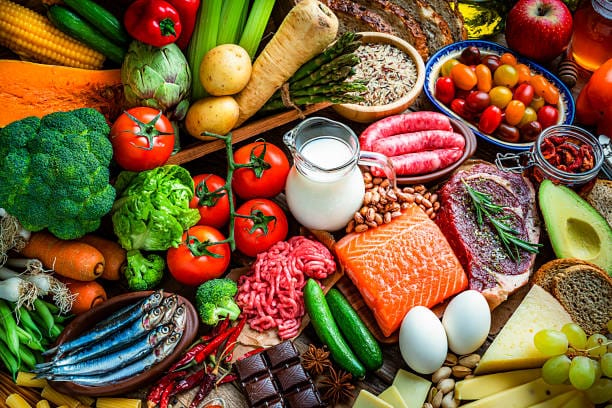What is a Balanced Diet?
A balanced diet refers to a diet that provides all essential nutrients in the right amounts, such as proteins, carbohydrates, fats, vitamins, minerals, and water. It not only helps the body grow properly but also strengthens it to fight diseases.
Balanced Diet: The Foundation of a Healthy Life
A balanced diet is fundamental for living a healthy life. It provides essential nutrients, energy, and protection against various diseases, such as:
- Preventing physical weakness and fatigue.
- Strengthening the immune system.
- Supporting better growth in children.
- Achieving and maintaining a healthy weight.
- Improving the health of skin, hair, and nails.
In today’s blog, we’ll explore the principles of a balanced diet based on information from Wikipedia, helping you improve your health and live an active life.
The Importance and Benefits of a Balanced Diet:
A balanced diet is crucial for a healthy and prosperous life. It ensures that all nutrients, including proteins, carbohydrates, fats, vitamins, minerals, and water, are consumed in the right proportions. This supports the body’s energy requirements, promotes physical and mental growth, and maintains overall health.
Key Principles of a Balanced Diet:
- Diversity in Food Choices
Avoid relying on a single type of food. Include various items such as grains, dairy products, meat, legumes, nuts, fruits, and vegetables in your diet.- Eat different grains like wheat, rice, oats, and corn daily.
- Include at least five different fruits and vegetables every week.
- Add lentils, meat, and eggs to your diet weekly.
Increased Intake of Fruits and Vegetables
- Fruits and vegetables are rich in vitamins, minerals, fiber, and antioxidants that keep the body healthy.
- Consume fruits as breakfast, snacks, or desserts.
- Eat vegetables raw, steamed, or lightly stir-fried to preserve their nutrients.
- Include leafy greens like spinach and lettuce in your meals.
- Aim for fruits and vegetables of various colors to get a range of nutrients.
- Importance of Proteins
- Proteins are essential for body growth, muscle building, strength, and cell repair. They also benefit hair, skin, and bones.
- Animal-based proteins: Meat, fish, eggs, and dairy products.
- Plant-based proteins: Lentils, chickpeas, and nuts.
- For vegans, include soy, quinoa, and tofu.
- Incorporating Healthy Fats
- Not all fats are harmful. Healthy fats benefit heart and brain health.
- Sources: Olive oil, fish oil, and nuts.
- Avoid saturated and trans fats.
- Prefer baking or grilling over frying.
- Balancing Carbohydrates
- Carbohydrates are a primary energy source. However, the type and amount matter.
- Choose whole grains like wheat, brown rice, and oats.
- Avoid processed foods like white flour and sugar.
- Opt for whole-grain bread instead of white bread.
- Limit sugary drinks and desserts.
- Reducing Sugar and Salt Intake
- Excess sugar and salt can lead to obesity, heart diseases, and high blood pressure.
- Minimize processed foods and drinks.
- Keep salt intake under 5 grams daily.
- Use natural sweeteners like honey or dates.
- Adequate Water Consumption
- Water is vital for bodily functions, toxin removal, skin health, and digestion.
- Drink a glass of water with each meal.
- Increase water intake during hot weather or exercise.
- Prioritize plain water over tea, coffee, or soda.
- Aim for at least 8–10 glasses daily.
- Portion Control
- Avoid overeating by controlling portion sizes.
- Divide your plate into portions:
- Half with vegetables and fruits.
- One-quarter with proteins.
- One-quarter with carbohydrates.
- Use smaller plates to reduce food intake.
Benefits of Eating Mangoes for Health
The Necessity of Regular Exercise for Older Adults
Examples of a Daily Balanced Diet Plan:
Breakfast:
1 boiled egg, 1 slice of brown bread, 1 glass of milk.
Lunch:
A bowl of vegetable curry, whole-grain bread (chapati), and yogurt.
Evening Snack:
An apple or a handful of almonds.
Dinner:
Grilled chicken, salad, and brown rice.
Benefits of a Balanced Diet:
- Improved Immunity: Enhances the body’s ability to fight diseases.
- Weight Management: Prevents obesity and maintains a healthy weight.
- Enhanced Brain Function: Promotes mental well-being and cognitive development.
- Better Skin Health: Leads to healthier, glowing skin.
- Longer and Healthier Life: Improves life quality and longevity.
Note:
This blog provides general information about a balanced diet based on various reliable sources. If you have specific health concerns or conditions, then consult a certified nutritionist or healthcare provider.
Summary:
Adopting a balanced diet is an ongoing journey. Small lifestyle changes can lead to significant health benefits. Incorporating a balanced diet into your daily routine is a wise decision for better physical and mental health. Always seek expert advice for personalized nutritional plans based on your needs.











